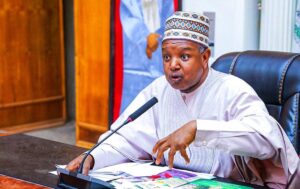The Nigerian Midstream and Downstream Petroleum Regulatory Authority (NMDPRA) has revealed that the Dangote refinery contributes an average of up to 20 million litres of petrol to the national supply daily.
Farouk Ahmed, CEO of NMDPRA, made the disclosure during the Association of Energy Correspondents of Nigeria (NAEC) annual conference in Lagos.
“Without a shadow of doubt, the operation of the 650,000 barrels per day Dangote refinery has changed the supply dynamics with an average daily contribution of up to 20 million litres, undoubtedly with potential for future ramp up, which we all hope we will see as we go along,” Ahmed said.
Represented by NMDPRA spokesperson George Ene-Ita, he noted that Nigeria’s national daily consumption stands at “around 50 million litres of PMS daily.”
“We need to encourage the biggest refinery to do all it can to begin to shape up in order for us to have local consumption and supply ramped up,” he added.
Ahmed further stressed the need to strengthen energy security, saying, “To further strengthen our energy security, we must operationalize petroleum product stock in line with the provisions of the PIA 2021 to provide a buffer against major supply disruptions.”
Read Also
He also highlighted the authority’s ongoing efforts to enhance regulatory oversight, including the implementation of licensing standards for storage and depot operations and intensified surveillance of product movements to curb “adulteration, arbitrage, hoarding, and truck-in-transit accidents.”
READ ALSO: PENGASSAN Strike Cripples Activities At NNPC, NUPRC, NMDPRA
“As a country, Nigeria is in urgent need of a diversified investment approach in our energy mix to further drive an expansion in the economy beyond the traditional focus on fossil fuels,” Ahmed said.
He noted the need to reduce dependence on any single energy source: “As we invest in that infrastructure, we must also ensure we diversify our energy sources and reduce dependency from any single fuel.
“It is important to note that the number of LPG filling plants in the country is less than 3,000, while the CNG compression station is less than 50 for a country of over 200 million citizens.”
Ahmed concluded that a strategic approach to developing alternative energy sources could drive sustained economic growth, create jobs, broaden the nation’s revenue base, and provide the government with diversified income streams to support inclusive and scalable national development.





